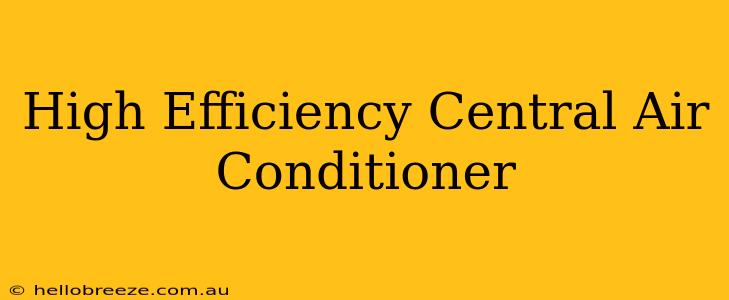Summer's heat can be brutal, but the right central air conditioner can keep your home comfortably cool while saving you money. This guide explores high-efficiency central air conditioners, helping you understand their benefits and how to choose the best system for your needs.
What Makes a Central Air Conditioner "High Efficiency"?
The efficiency of a central AC unit is measured by its Seasonal Energy Efficiency Ratio (SEER). The higher the SEER rating, the more efficient the unit. Traditional air conditioners often have SEER ratings around 13, while high-efficiency models boast ratings of 16 or higher, some even reaching 26 SEER or more. This means they use less energy to achieve the same level of cooling, translating to lower energy bills and a smaller carbon footprint.
Key Factors Influencing Efficiency:
-
Compressor Technology: High-efficiency models often utilize variable-speed compressors or two-stage compressors, allowing for more precise temperature control and reduced energy consumption. These compressors adjust their speed based on the cooling needs, unlike single-stage compressors that run constantly at full power.
-
Refrigerant: The type of refrigerant used also impacts efficiency. Modern, high-efficiency units typically use refrigerants with a lower global warming potential.
-
Airflow Management: Efficient airflow management minimizes energy loss. Features like improved ductwork design and variable-speed blowers contribute to optimized cooling performance.
Benefits of Choosing a High-Efficiency System
Investing in a high-efficiency central air conditioner offers numerous advantages beyond lower energy bills:
-
Significant Cost Savings: The long-term savings on electricity can be substantial, often offsetting the higher initial purchase price within a few years.
-
Environmental Friendliness: Reduced energy consumption means a smaller carbon footprint, making it a more environmentally responsible choice.
-
Improved Comfort: High-efficiency systems often provide more consistent and comfortable cooling due to features like variable-speed operation and improved airflow control.
-
Increased Home Value: Energy-efficient upgrades can significantly increase your home's value, making it a worthwhile investment.
-
Longer Lifespan: While the initial cost is higher, high-efficiency units often have a longer lifespan compared to standard models, reducing the frequency of replacements.
Choosing the Right High-Efficiency AC Unit for Your Home
Selecting the correct AC unit involves considering several factors:
-
Home Size and Layout: The size of your home directly impacts the cooling capacity required. A qualified HVAC technician can perform a load calculation to determine the appropriate tonnage (cooling capacity) for your specific needs.
-
Climate: The climate in your area influences the cooling demands. Hotter and more humid climates will necessitate a more powerful and efficient unit.
-
Budget: High-efficiency units come with a higher initial cost, but the long-term savings often justify the investment.
-
Professional Installation: Proper installation is crucial for optimal performance and efficiency. Always hire a qualified and experienced HVAC technician for installation and maintenance.
Maintenance for Maximum Efficiency
Regular maintenance is vital for prolonging the lifespan and maintaining the efficiency of your high-efficiency central air conditioner. This includes:
- Annual Inspections: Schedule annual inspections by a qualified technician to identify and address potential issues early.
- Air Filter Changes: Regularly changing your air filters prevents dust and debris from accumulating and reducing efficiency.
- Coil Cleaning: Keeping the evaporator and condenser coils clean improves airflow and performance.
Choosing a high-efficiency central air conditioner is a smart investment that pays off in comfort, cost savings, and environmental responsibility. By understanding the factors influencing efficiency and making an informed decision, you can ensure your home stays cool and comfortable for years to come. Remember to consult with a qualified HVAC professional to determine the best system for your specific needs and ensure proper installation.

